Connecting with Global Trends through Public-Private Cross-Sector Collaboration for Nature Conservat
2024 Taiwan Biodiversity Forum
Connecting with Global Trends through Public-Private Cross-Sector Collaboration for Nature Conservation 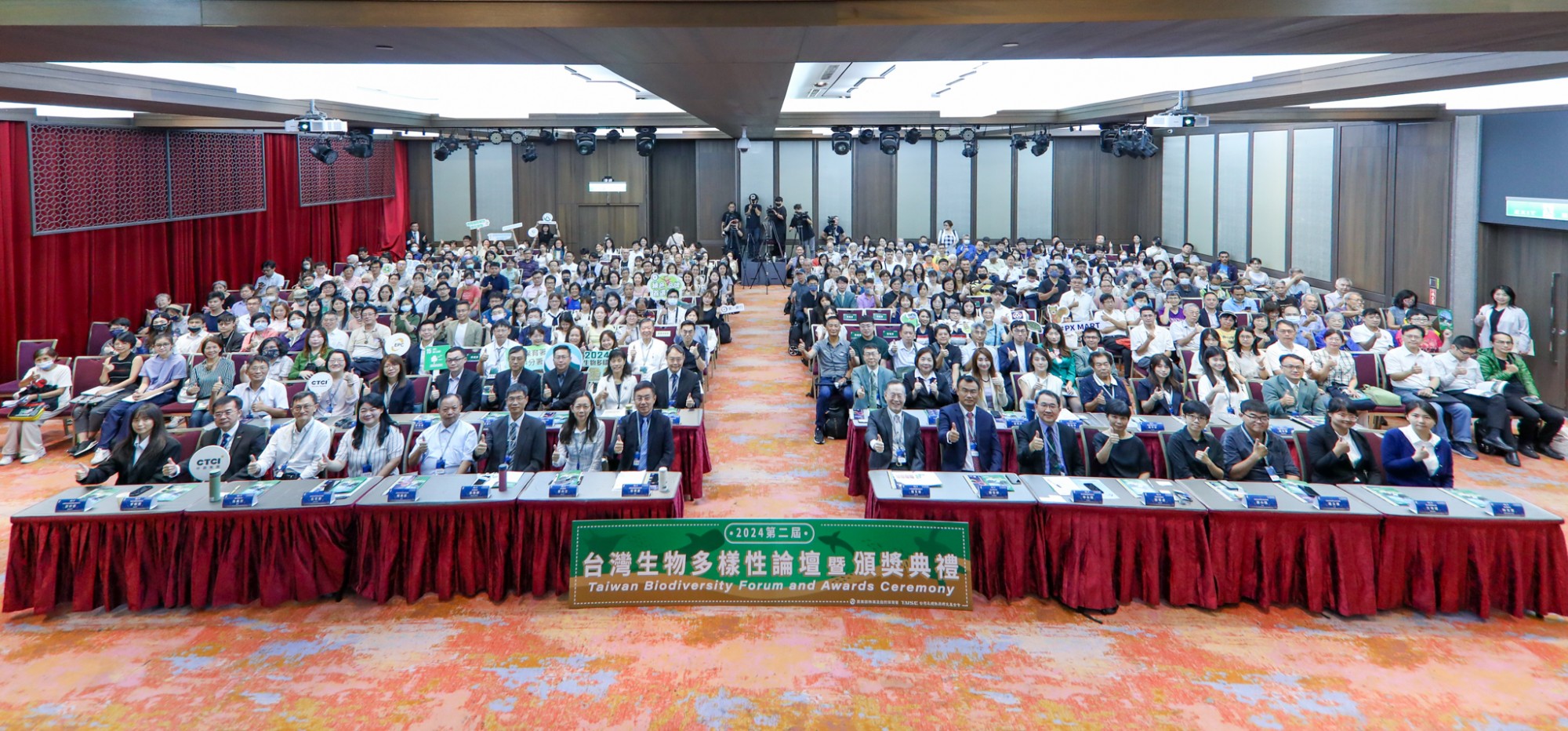
▲The 2nd Taiwan Biodiversity Forum and Awards Ceremony (TWBA 2024) drew 451 on-site attendees and reached a total participation of 1,119 people including online participants, all showing their commitment to biodiversity concerns.
The Taiwan Institute for Sustainable Energy (TAISE) continued to advocate for biodiversity awareness and protection through concrete actions. Their collaboration with the Forestry and Nature Conservation Agency to host the "2024 Taiwan Biodiversity Forum" drew more than a thousand participants across both physical and virtual platforms.
In response to the global Convention on Biological Diversity conference held in October, the forum showcased Taiwan's land and marine biodiversity strategies. Experts encouraged businesses to align with global trends, taking action to enhance competitiveness and social impact.
According to TAISE Chairman Dr. Eugene Chien, research from the World Economic Forum (WEF) and various think tanks showed that biodiversity loss wasn't just affecting agriculture, forestry, and natural systems. It was also creating financial risks for public utilities and enterprises.
During the forum, the 2024 "Taiwan Biodiversity Awards" were presented. Judging panel head and former Agriculture Minister Chi-Chung Chen commended winners for their sustained commitment, achievements, and stakeholder collaboration. He warned that "biodiversity loss will severely impact all people of this land," calling for urgent cross-sector action.
In recognition of Taiwan's public and private organizations' dedication to biodiversity initiatives, Rob Muller, Chairman of the Jane Goodall Institute Global, recorded a congratulatory video message emphasizing that biodiversity issues are complex and urgent, requiring attention and action at both individual and collective levels.
Kelly Kok, Executive Director of Jane Goodall Institute Taiwan, encouraged businesses, universities, government agencies, hospitals, and NGOs to work together, focusing on both institutional changes and technological innovations to tackle environmental challenges for Earth.
Policy Enhancement and Management: Calling for Corporate Action
Director General Lin of the Forestry and Nature Conservation Agency stated that Taiwan has integrated ministerial resources to launch the "National Ecological Network Blueprint," connecting communities and enterprises for production-conservation coexistence. In 2024, a "Corporate Participation in Natural Carbon Sink and Biodiversity Conservation Platform" was established to advance business-government cooperation in land restoration initiatives.
Deputy Minister Hsiang-Wen Huang of the Ocean Affairs Council noted that the newly passed Marine Conservation Act enables the establishment of marine protected areas. With the Executive Yuan's marine pollution fund approval, these measures aim to better control waste and recreational impact
Deputy Director-General Wu of Ocean Conservation Administration reported that their efforts in coral reef and seagrass restoration, along with civilian partnerships for sea turtle and cetacean conservation, have shown good results. They will continue focusing on managing existing protected areas effectively.
Dr. Ming-Shiou Jeng from Academia Sinica's Biodiversity Research Center warned that coral reefs, particularly at Dongsha Atoll, face critical threats from climate warming and crown-of-thorns starfish outbreaks. Drawing from extensive research, he emphasized the urgency for enhanced marine education and community engagement rather than relying solely on government intervention.
Supporting Dr. Jeng's view, Lianjiang County's Industrial Development Director Chih-Feng Lin highlighted Matsu's wildlife conservation achievements. The region has successfully protected terns and Rhagophthalmidae while fostering eco-tourism through expert-guided ecological tours and community engagement.
National Dong Hwa University Professor Yi-Fang Sun, a long-term researcher of Malaysian tropical forests, called for broader environmental awareness among Taiwanese businesses and consumers. Noting Taiwan's position as Malaysia's second-largest timber importer, Sun questioned the willingness to opt for rainforest-friendly products.
National Taiwan University's Bio-resources and Agriculture Dean Yu-Pin Lin cautioned businesses to balance profit with environmental responsibility, emphasizing that biodiversity impacts daily life.
Starting from Core Competencies - The Gold Standard Benchmark:"Taking the Right Action!"
Two-time "Taiwan Biodiversity Award - Gold Level" recipient E.SUN Financial Holding's Senior Manager Ching-Yu Chang highlighted the decade-long "E.SUN Wulami Project's" success in supporting small farmers. The company has expanded its environmental impact through biodiversity-traceable loans, with Chang emphasizing corporate leadership as crucial for accelerating sustainability initiatives.
CTCI Group's CSO Joanne Ho shared how their reclaimed water plant project has evolved into an environmental education hub. She urged sustainability partners to maintain their commitment, emphasizing that persistence drives meaningful change.
The Highway Bureau's Southern Branch has transformed Provincial Highway 26 in Pingtung into the world's first continuous crab corridor since 2008, collaborating with scholars, experts, and NGO groups. Deputy Director Wang Ching-Hsiung noted that success came through stakeholder dialogue and flexible construction approaches. The experience taught him to "listen to all voices" and "just do it when it's right," he added.
Expert View: Think from Environmental Angle, Act through Value Chain
The UN Biodiversity Conference (COP15) in 2022 adopted the "Kunming-Montreal Global Biodiversity Framework," with Target 15 emphasizing "corporate responsibility." Dong-Li Mo,Secretary General of the Business Council for Sustainable Development suggested that enterprises should follow the "ACT-D" action framework integrated by the World Business Council for Sustainable Development (WBCSD). Through the stages of Access, Commit, Transform, and Disclose, enterprises can evaluate and work toward nature-positive goals. Moreover, he emphasized the need to move beyond focusing on a few flagship species and expand from "value chain" to systemic transformation.
Sustain-Vision Consulting Director Yao-De Chen warned about Earth's environmental tipping points, urging businesses to evaluate their objectives against scientific ecological standards, particularly in biodiversity, water, and land use. He stressed that natural capital's irreversible nature makes environmental acceptance crucial for future generations' survival.
Vice Minister of the Ministry of Environment, Wen-Chen Shih, responded that while government agencies can implement mandatory measures for enterprises, the long-term key lies in the determination of corporate leaders. She also hopes that investors and consumers can join in monitoring and driving this initiative.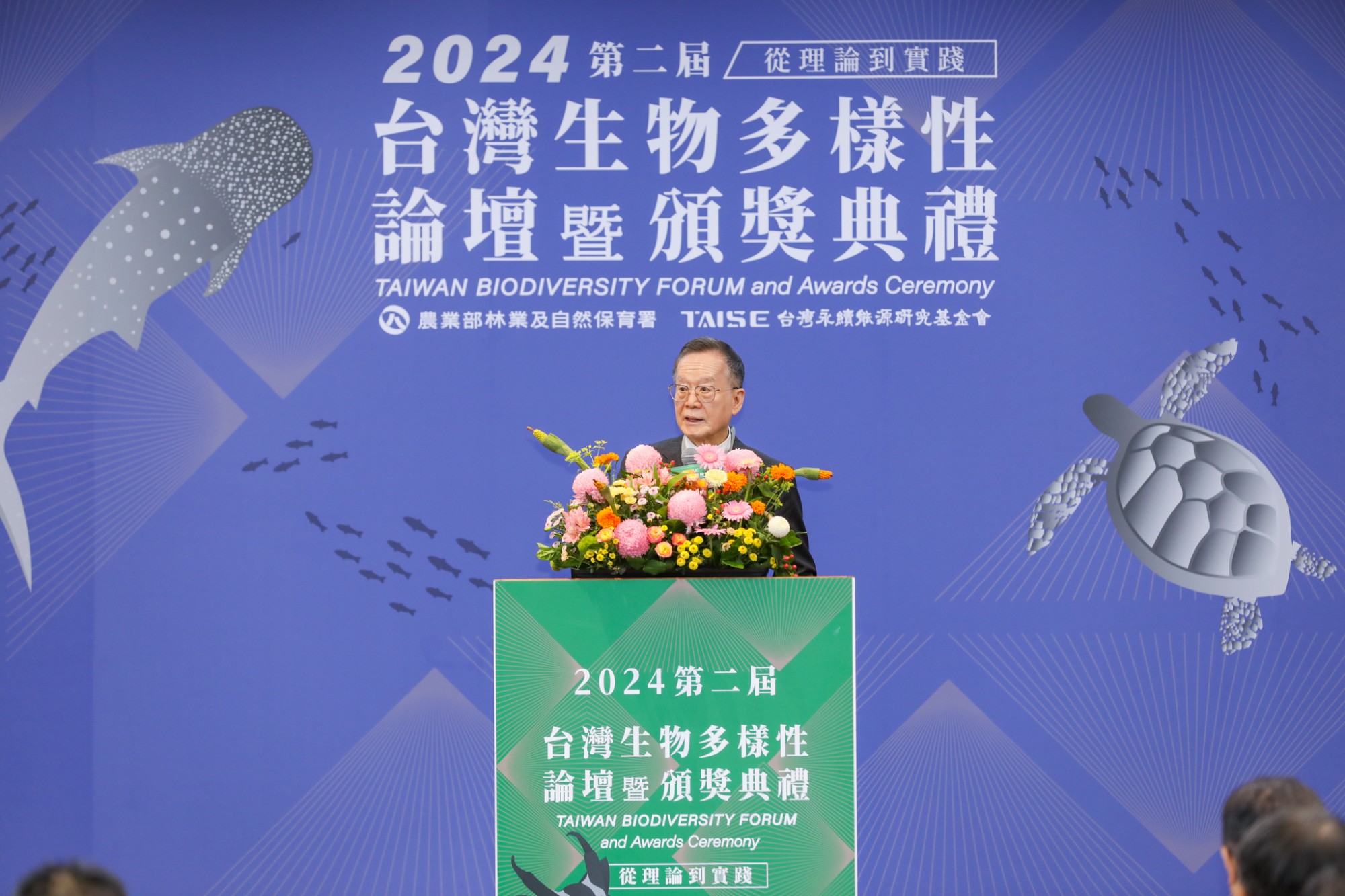
▲Ambassador Eugene Chien, Chairman of the Taiwan Institute for Sustainable Energy (TAISE), delivered a speech at the "Taiwan Biodiversity Forum and Awards Ceremony" on the 16th. 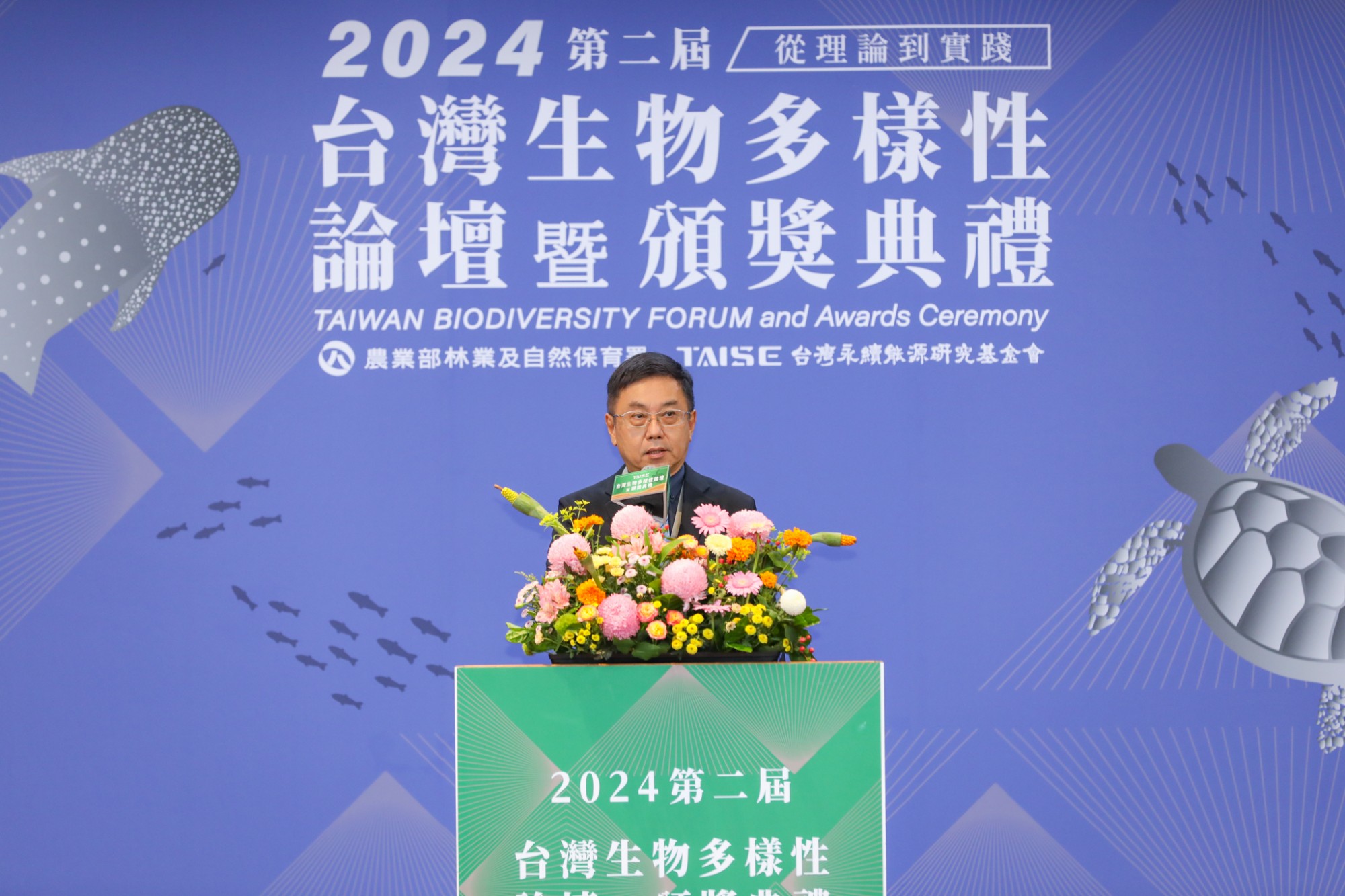
▲Director General Lin Hwa-ching of the Forestry and Nature Conservation Agency, Council of Agriculture, delivered a speech at the "Taiwan Biodiversity Forum and Awards Ceremony" on the 16th. 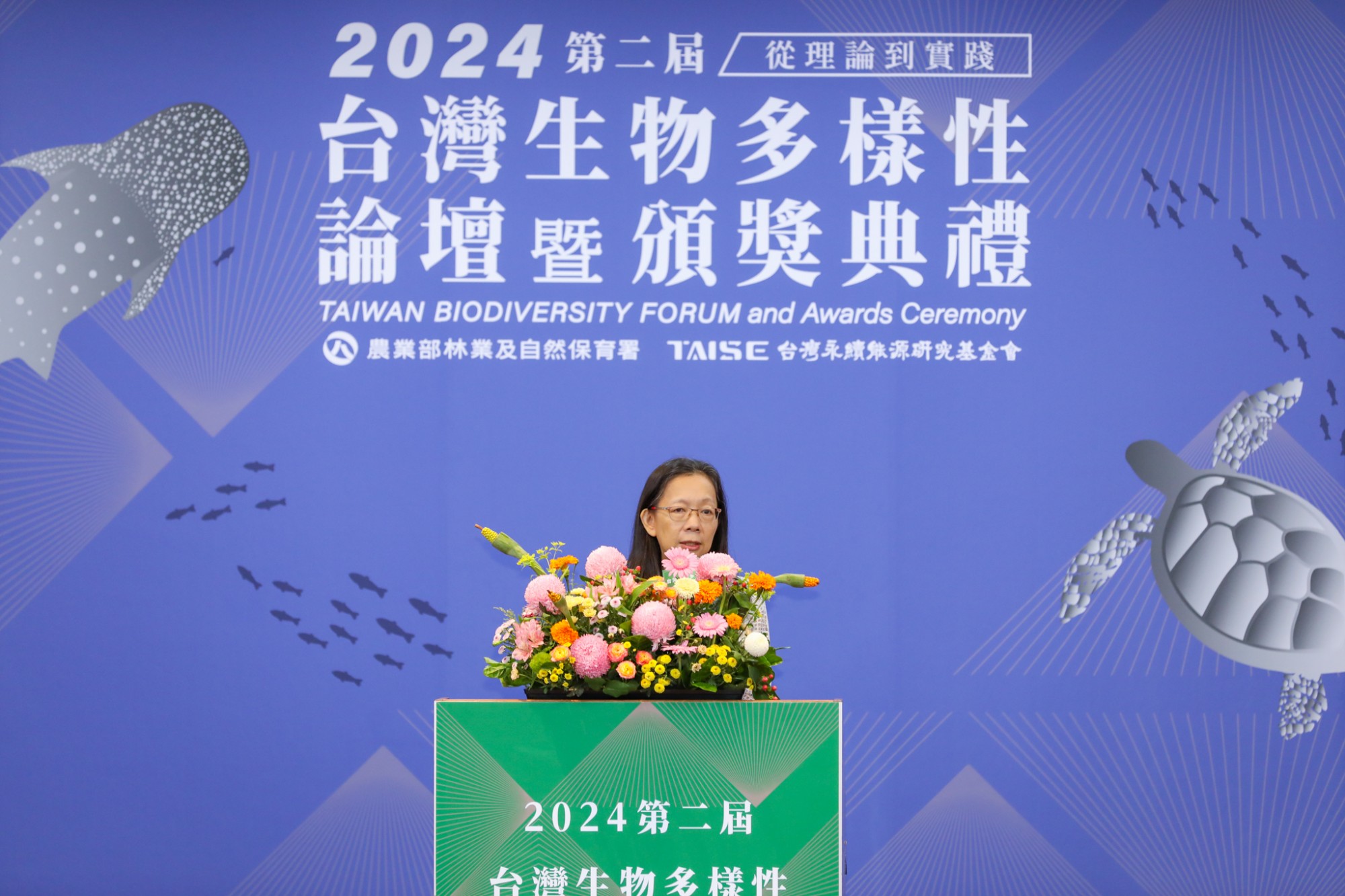
▲Deputy Minister Huang Hsiang-wen of the Ocean Affairs Council delivered a speech at the "Taiwan Biodiversity Forum and Awards Ceremony" on the 16th. 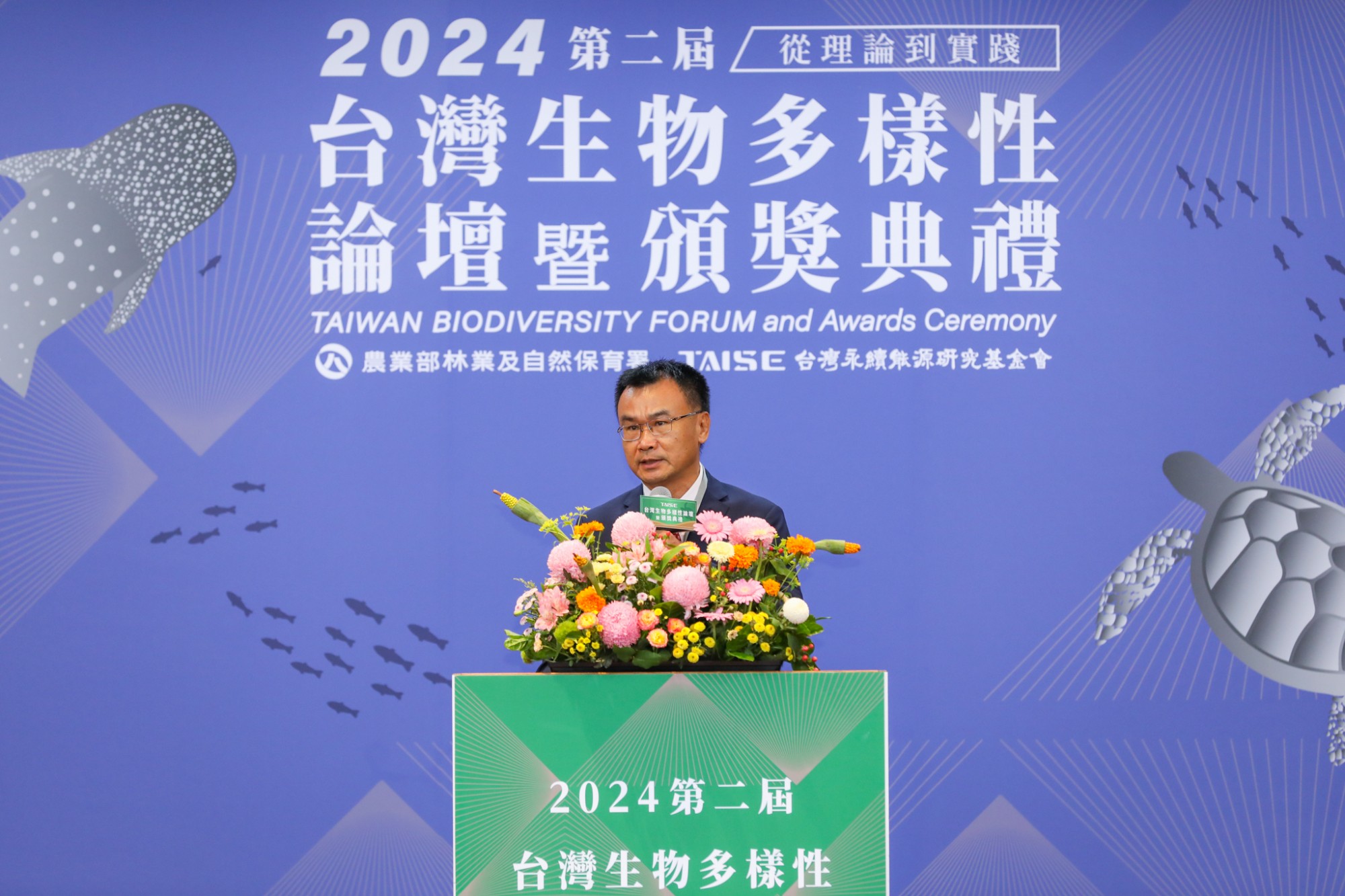
▲Former Minister Chen Chi-chung of the Council of Agriculture delivered a speech at the "Taiwan Biodiversity Forum and Awards Ceremony" on the 16th.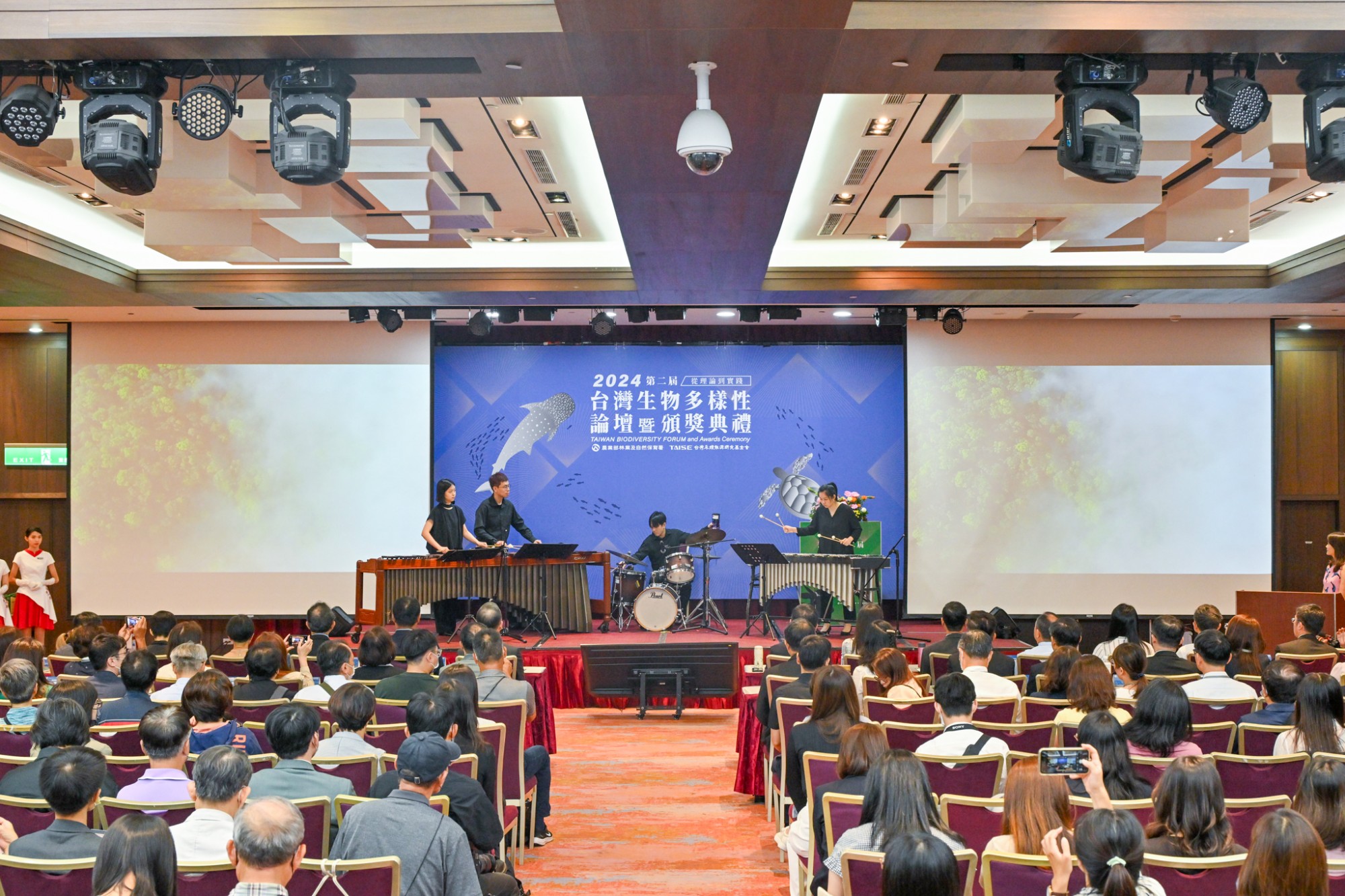
▲The Taipei Percussion Group performed the opening act, playing pieces including "Forest" and "Hoping for the Spring Breeze" accompanied by Chi Po-lin's documentary "Beautiful Taiwan" and the award-winning films from the 2024 2nd Taiwan Biodiversity Awards. 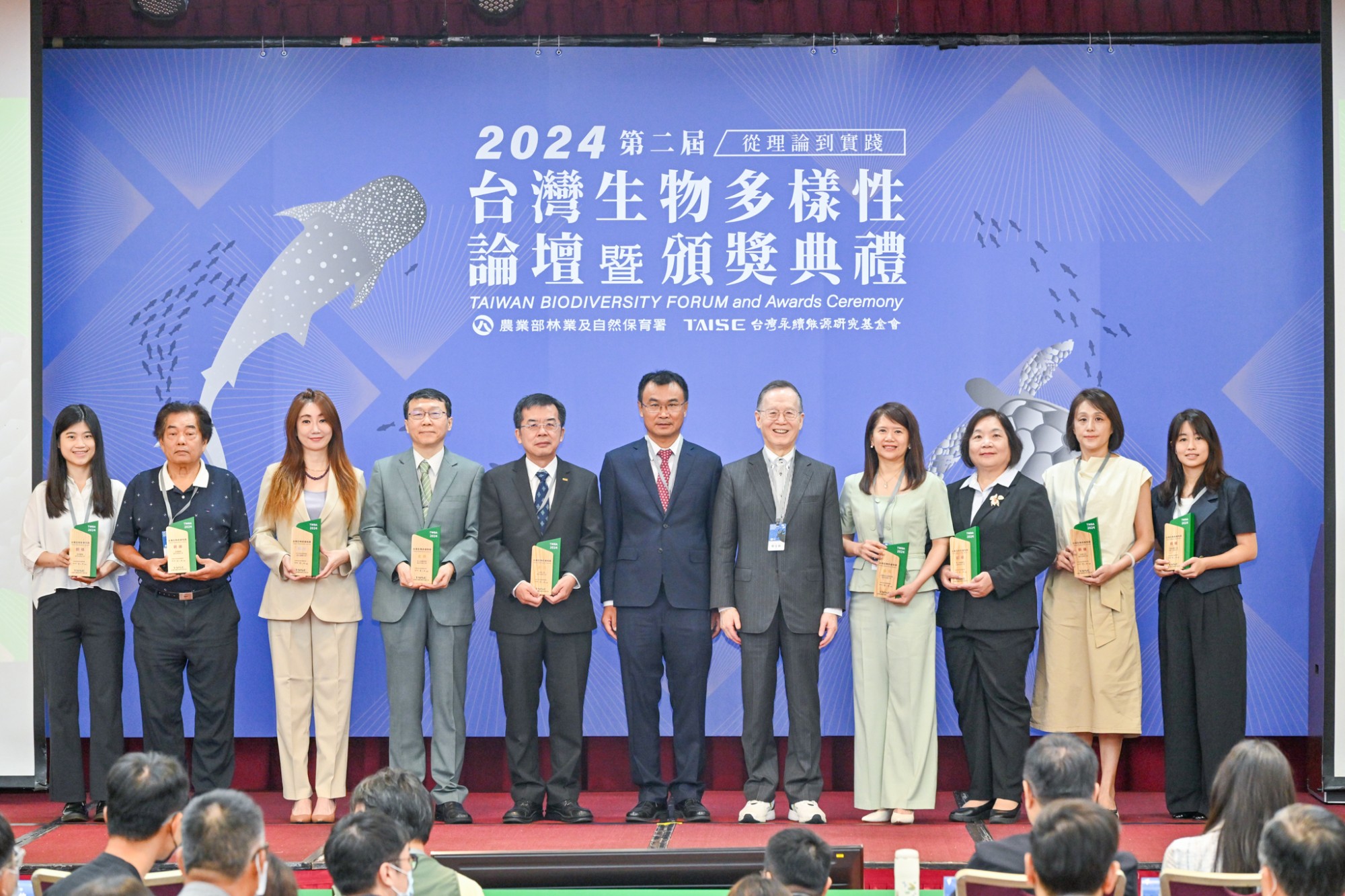
▲Award Committee Convener Chen Chi-chung (center) and TAISE Chairman Ambassador Eugene Chien (fifth from right) jointly presented awards to winning enterprises in the Profit-making Business Category of the Taiwan Biodiversity Awards. 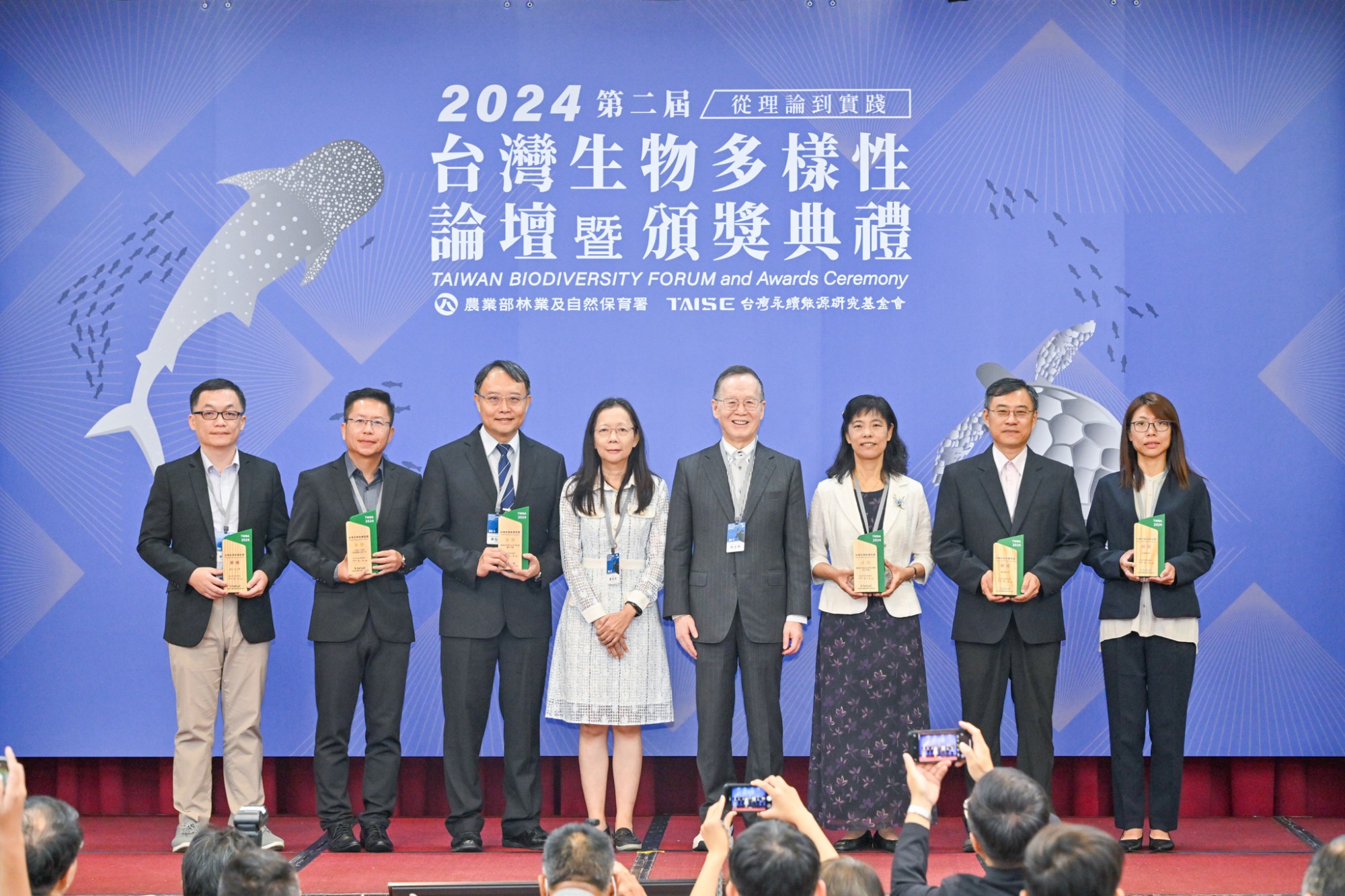
▲TAISE Chairman Ambassador Eugene Chien (fourth from right) and Ocean Affairs Council Deputy Minister Huang Hsiang-wen (fourth from left) jointly presented awards to winning organizations in the Profit-making Business Category.
Attachment: Case Studies of Gold Award Winners in the "2024 Taiwan Biodiversity Awards"
*Profit-making Business Category*
E.SUN Financial Holding Co., Ltd.
The company enhances biodiversity through habitat creation and ecological maintenance by implementing Nature-Based Solutions (NBS). They combine local Bunun tribal ecological wisdom and traditional knowledge to improve the environment of Nan'an rice paddies, striving to achieve the United Nations Convention on Biological Diversity's vision of "Living in Harmony with Nature." The "E.SUN Warami Project" not only achieves organic transformation but also unites industry, government, and academia to improve the natural ecology of the Nan'an tribal community, gradually restoring local biodiversity. Furthermore, they integrate this with their core business by developing sustainable agricultural financial products, working together with farmers across Taiwan to contribute to the country's natural environment.
CTBC Financial Holding Co., Ltd.
The company actively aligns with the United Nations Sustainable Development Goals (SDGs) through three main pillars: "Sustainable Growth," "Responsible Operations," and "Social Prosperity." In recent years, they have gradually increased their focus on natural issues, and in 2022, they became Taiwan's first company to officially join the Taskforce on Nature-related Financial Disclosures (TNFD). By the end of 2023, referring to TNFD's official framework (V1.0) released in September of the same year and the additional guidance for financial institutions (Sector guidance: Additional guidance for financial institutions Version 1.0), they published Taiwan's first nature-related financial disclosure report following the V1.0 framework, comprehensively and systematically disclosing their progress and actions on nature-related issues.
CTCI Corporation
Integrating with their core business, the company promotes water reclamation plants as an effective adaptation measure, simultaneously maintaining human well-being and biodiversity benefits. They emphasize ecological protection throughout all stages of their turnkey engineering projects and organize volunteer activities to connect with local organizations, promoting biodiversity in aquatic environments. The water reclamation plants not only demonstrate environmental performance but also serve as venues for environmental education and culture. By 2025, they are expected to produce approximately 138,000 tons of reclaimed water daily, equivalent to meeting the water needs of 480,000 people. Additionally, centered around the Nothern Sulfur creek near their headquarters, they launched the "Taipei City Nature Tracker Ecological Survey," documenting birds, plants, and insects at Taipei's nine major cultural exhibition halls. Implementing local ecological care actions, they have already recorded 920 species in 2023 alone, with plans for continued expansion.
*Non-profit Business Category*
Taichung Branch, Forestry and Nature Conservation Agency, Council of Agriculture
The agency actively connects cross-domain cooperation and protects Central Taiwan's biodiversity through measures such as protecting endangered species and controlling invasive species to reduce ecological threats. They sustainably manage national forest lands while balancing environmental, social, and economic aspects, creating healthy forests, and ensuring sustainable production and reasonable utilization of forest resources. In 2022, all managed forest lands obtained FSC certification. They also work closely with local indigenous peoples, communities, local governments, and NGOs in their jurisdictional forest areas to promote resident participation in biological and cultural diversity conservation work.
Hsinchu Branch, Forestry and Nature Conservation Agency, Council of Agriculture
In collaboration with the Taiwan Forestry Research Institute, they established an ex-situ conservation and restoration area for threatened plants in Bantian Liao, Miaoli. They collect, cultivate, and propagate wild plant germplasm from surrounding townships, then further promote these plants to nearby communities or reintroduce them to their native environments to reduce extinction risks. In 2023, they completed the collection of 36 species (83.72%) of germplasm, of which 30 species (69.77%) have been successfully propagated and planted in the Bantian Liao ex-situ restoration area. They also work hand in hand with surrounding schools, conservation groups, and local workers to preserve and plant these species in at least 10 different locations.
Southern Region Engineering Maintenance Office, Directorate General of Highways
Noticing the frequent incidents of gravid female crabs being crushed by passing vehicles during peak breeding seasons, they have actively engaged in land crab conservation research since 2008. They collaborate with cross-departmental scholars, experts, land crab researchers, and NGO groups to participate in planning and improving land crab corridor initiatives. They transformed the section of Provincial Highway 26 from Chuanfanshi to Shadao in Pingtung into the world's first continuous crab corridor. The corridor features nature-based solutions using natural materials to improve experimental microhabitats. They also promote local community support for ecological conservation, achieving the goal of "giving the road back to crabs."

